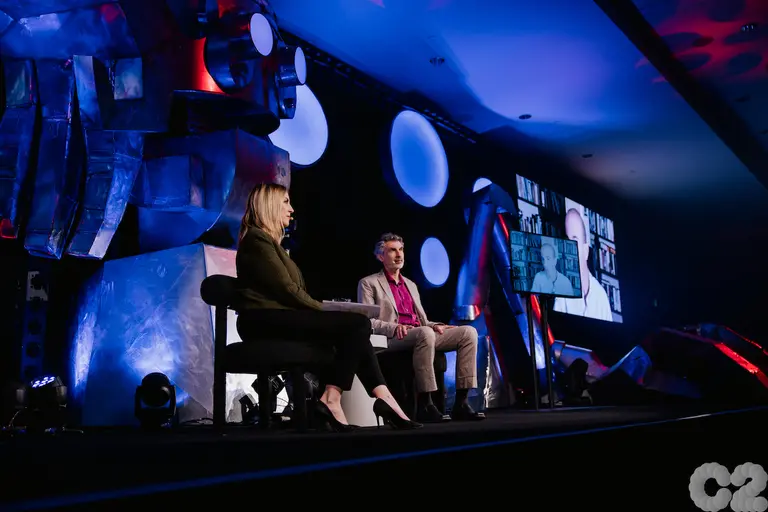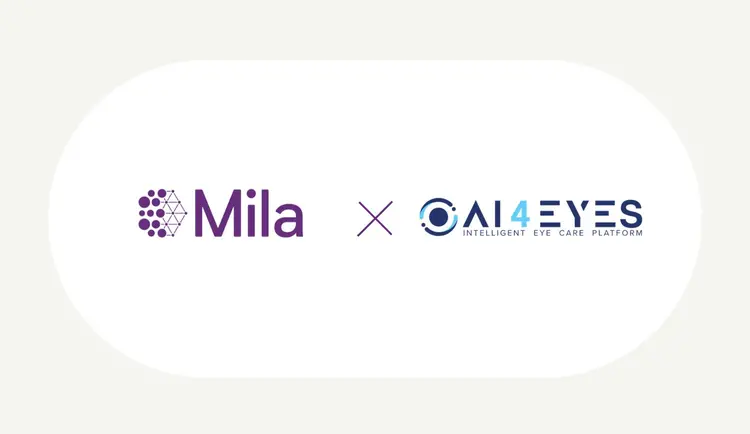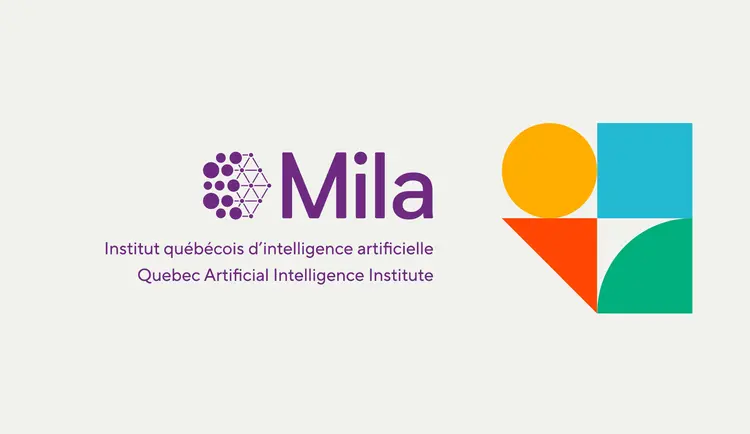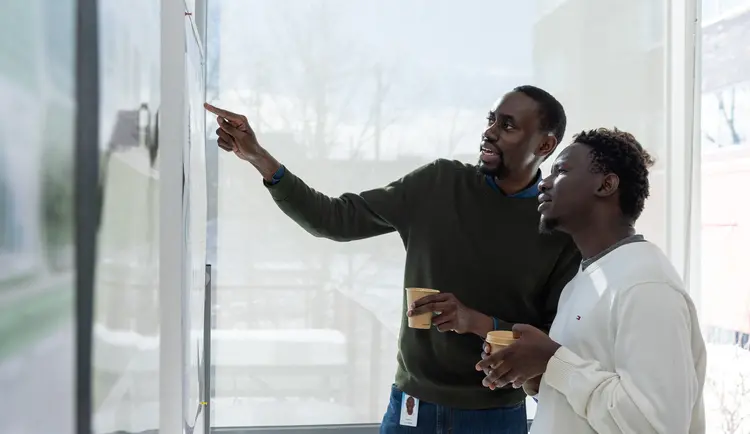
Mila Founder and Scientific Director Yoshua Bengio discussed artificial intelligence (AI), challenges to modern civilization, and how to preserve democracy with world-renowned historian and author Yuval Noah Harari at C2 Montreal on May 24, 2023.
Yoshua Bengio spoke for the first time with the author of Sapiens: A Brief History of Humankind, Homo Deus: A Brief History of Tomorrow, and 21 lessons for the 21st century during a high-level conversation moderated by prominent Canadian journalist Vassy Kapelos.
“I’m not a deep fake or an AI“, Yuval Noah Harari joked as he virtually joined the discussion held at the Fairmont The Queen Elizabeth Hotel in Montreal.
Both him and Yoshua Bengio share concerns that AI development could threaten democracy and humanity and recently signed an open letter asking for a pause on giant AI models more powerful than GPT-4.
“I thought it was a really good way to call attention to the problem to the general public and to governments. Even people in companies have been discussing behind closed doors since the letter, so it has worked in that sense,” Yoshua Bengio said in front of a packed room at the annual business conference.
Existential risk
Professor Bengio explained that humans remain overall smarter than current AI tools but expressed concerns that future AI systems could soon get out of control. He argued for caution and for giving society enough time to adapt and to put proper guardrails in place.
“The problem is that there’s a lot of uncertainty about the timeline,” he said.
“It could take a few years, or it could take decades to build machines as intelligent as us. But because of that uncertainty, we have the responsibility to prepare for the worst case scenarios,” he added, emphasizing that society should prepare for the transition as soon as possible, especially with regards to the job market.
Yuval Noah Harari agreed and reminded the audience that technological evolution is much faster than biological evolution and that human societies change slowly.
“We need to focus society’s attention on these problems. Many of our most current problems can get much much worse because of AI,” Harari said.
He doubled down on the idea that we need to start thinking carefully about future AI development.
“It’s an existential risk for humanity, and what we need most of all is time,” he said.
“This is the first technology in history that can make decisions and create ideas by itself… It’s fundamentally different from everything we’ve seen before because it can take power away from us,” he warned.
“It took us many generations to figure out how to build relatively good industrial societies. On the way, we had some terrible, failed experiments –nazism and Soviet communism– that killed millions of people.”
“There is certainly a way to build good societies with AI, but it will take time and we need to make sure we don’t make any more such failed experiments… We won’t get a second chance, we won’t survive it,“ he said.
AI and social media
Bengio and Harari agreed that politicians should focus more on regulating AI and stressed the importance of preserving democracy, which could be jeopardized by malevolent actors armed with powerful AI tools.
“Politicians for the most part want to talk about positive things… but we need to face the dangers, the sooner, the better,” Yoshua Bengio said.
“It’s going to take time for politicians to accept that they have a responsibility here not just to be thinking about the benefits of AI, but also that they have a duty to protect the public against the short term and long term consequences.”
Among short term consequences, he said that AI tools could be used to manipulate citizens to undermine democracy.
“Tools derived from large language models (such as ChatGPT) could be used for propaganda, disinformation, and personalized trolls that could convince you to vote in a certain way,” he warned.
Harari said that sophisticated bots learning from users and adapting their behaviors to manipulate them are a threat to democracy and that ultimately, it is the government’s responsibility to regulate AI.
“We are now facing a paradox: we have the most sophisticated and powerful information technology in history and yet people are no longer able to talk with one another or agree on who won the last election or whether vaccines are good or bad for you,” he said.
He suggested rules to prevent the counterfeiting of humans, similar to laws to prevent the counterfeiting of money, and to get rid of social media bots by having to sign up in a brick and mortar building by signing a piece of paper.
“Bots don’t have free speech or rights, humans do,” he said, prompting warm applause from the audience.
He also emphasized the need to maintain a good social dialogue in order to preserve democracy.
“If you are talking with someone, you need to know whether it’s a human or an AI. If we don’t do that, then the public conversation collapses, and democracy cannot survive.”
Saving democracy
Both Bengio and Harari worried that democracy itself is in danger, and that current problems could be amplified by an out-of-control AI development.
“Demagogy has existed for thousands of years, as much as democracy has, but it could be amplified by social media and could be further amplified with AI,” Yoshua Bengio said.
“I would like us to think through our options: are there ways that we can organize society that is safe in the sense of safe AI, and can we preserve our human values, rights, dignity and democracy? It’s a difficult one but it is worth spending our best brains’ time on these kinds of questions,” he later said.
Harari also argued that we need democracy to properly regulate AI.
“The only realistic way to save humankind is first of all to save democracy,” he said, explaining that authoritarian regimes would be worse to regulate AI as they fundamentally believe in their own infallibility, much like current AI systems.
“AI is not infallible. It can process a lot of information, but information is not truth,” he said.
“ Only democracies have the checks and balances necessary to identify mistakes and correct them.”
The road ahead
Yoshua Bengio drew a parallel between AI development and the fight against climate change to share guidance on the best way forward.
“People have been fighting for decades for us to change our ways to deal with climate change. It may seem like a desperate cause, but people continue fighting, continue trying, and that’s what we need to do with the challenge of AI.”
“It’s worth it because we might bring good health to everyone, education, solve climate change and we might even be able to reform society completely in ways that might be better than the current kind of society we have in terms of democracy and well-being of people.”
While both him and Harari did not go as far as saying that they are optimistic about the future, they did agree that all efforts should now be focused on fighting for change.
“We created the problem, we still have the power to fix it,” Harari said.
“Ultimately, the problem is us, not AI,” he added, pointing at the fact that most of the current problems can be traced to bad human actors using AI in a malevolent way.
“If we spent as much time on developing and understanding our own minds as we spend on developing AI, we would be saved.”
Yoshua Bengio said that the only way to converge to a system that preserves our values is by changing humanity with more public awareness and education.
“We have a moral duty to go for the optimistic solution and try to make it happen.”
Watch the full conversation





